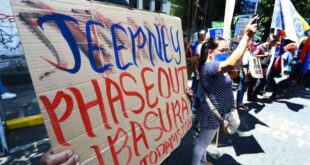THE presence of a dilapidated Philippine vessel, BRP Sierra Madre, on Ayungin Shoal should not threaten anyone, especially a superpower like China. People should remember that the ship was intentionally grounded there in 1999 in response to the growing Chinese military presence in the South China Sea, including areas within the territories of other countries in the region. Ayungin Shoal, which is also referred to as Second Thomas Shoal, is part of the Spratly Islands that are claimed by Brunei, Malaysia, Vietnam, and, of course, China and the Philippines. Ayungin is also an atoll that is within the country's exclusive economic zone.


In 1995, four years before the grounding of the BRP Sierra Madre, China built structures on Panganiban Reef, which is also known as Mischief Reef. The Philippines protested, but China insisted that the structure was meant to shelter fishermen during storms. China started expanding its structure and creating an island through reclamation. And by 2016, the reef had been transformed into a Chinese military installation, complete with a runway.
In the late 1990s, the Philippine government was understandably concerned that Ayungin Shoal was next on China's list of land features that it might occupy and likely fortify. The shoal is only 194 kilometers west of Palawan, closer to that island province than Panganiban Reef.
Last week, Orlando “Orly” Mercado, who was the Defense secretary then, said he had wanted more vessels to be run aground on Ayungin Shoal. Apparently, the Philippines was unable to find or spare any more rust buckets, which is not an inaccurate way to describe that World War 2-vintage vessel stuck on that atoll.
By wanting to ground more ships there, Mr. Mercado was essentially debunking China's claim that the Philippine government at the time had vowed to remove the BRP Sierra Madre, which now serves as a small military outpost. Also, no one from the incumbent government could confirm or recall any such assurance given to China.
President Ferdinand Marcos Jr. recently told reporters that he, too, was unaware of any such promise. But even if one had been made, he said he was effectively rescinding it.
Clearly provocative
In contrast, China's recent attempt to blockade Ayungin Shoal and prevent the Philippines from resupplying its troops there appeared overtly aggressive. In video clips released to the media, the China Coast Guard is shown blocking small boats and even shooting them with a water cannon.
As other Southeast Asian leaders have said, superpowers need to behave responsibly. Tension in the South China Sea, known to Filipinos as the West Philippine Sea, is already running high. Like everyone else, the Philippines wants to avoid an escalation, which could be triggered by mistakes or miscalculations. For now, the Philippines has filed yet another diplomatic protest against China.
China has been upset with the Philippines, more so after the Marcos government renewed security cooperation with the United States, which now has access to more local military bases. China even accuses the Philippines of being the bully in the region, because of its military pact with the US and its allies. But those presumptions are off the mark.
Clearly, the Philippines wants — more likely, needs — stable and peaceful relations with China. Not only is it poised to be the biggest economy in the world, but China is also one of this country's closest neighbors. Moreover, peace in the region is also key to global stability and prosperity.
Mr. Marcos has repeatedly said the Philippines wants to steer clear of any superpower rivalry. But no country will just keep silent when its security and other interests are threatened. To paraphrase the President, the Philippines wants to be friends to all, but not at the expense of its territory.
Despite its differences with Beijing on Ayungin Shoal, the government remains open to crafting some arrangement with all the rival territorial claimants that would preserve peace in the region. The challenge is for the Philippines to impress on those neighbors that being pro-Filipino does not mean being pro-American or even anti-Chinese.
*****
Credit belongs to : www.manilatimes.net
 MaharlikaNews | Canada Leading Online Filipino Newspaper Portal The No. 1 most engaged information website for Filipino – Canadian in Canada. MaharlikaNews.com received almost a quarter a million visitors in 2020.
MaharlikaNews | Canada Leading Online Filipino Newspaper Portal The No. 1 most engaged information website for Filipino – Canadian in Canada. MaharlikaNews.com received almost a quarter a million visitors in 2020.

